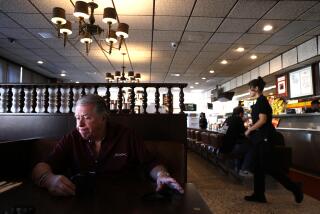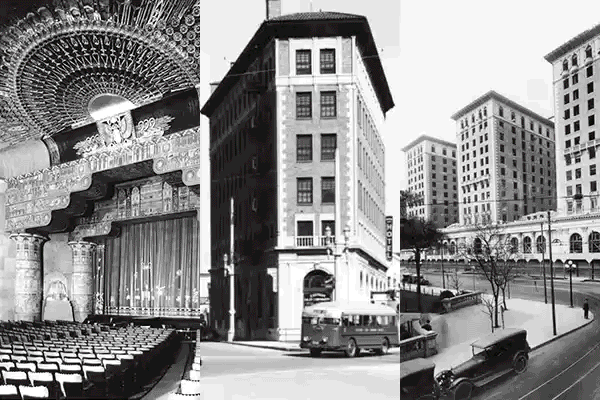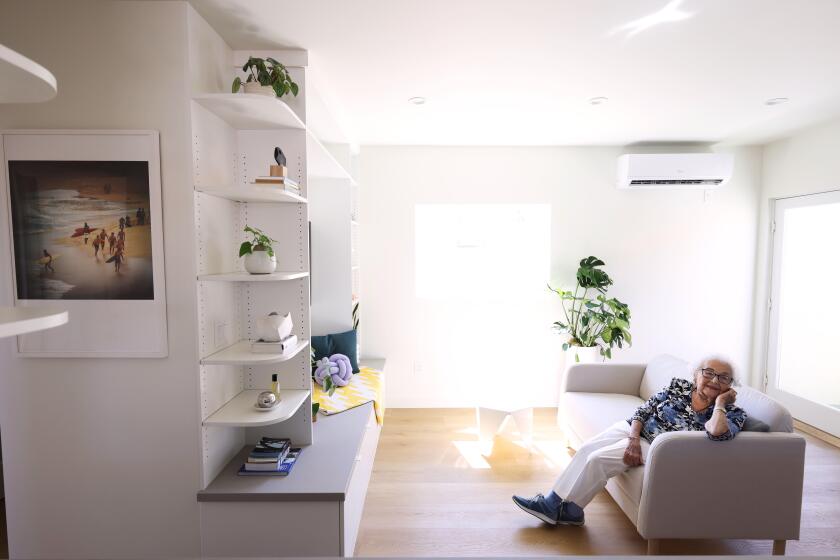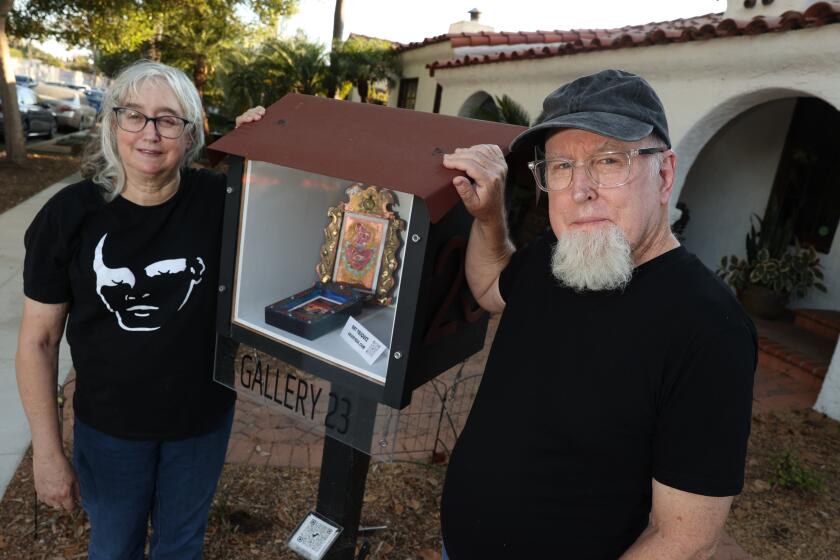Unmasking Masquers: End of a Landmark? : Hollywood Club for Entertainers Faces Demolition of Its 58-Year-Old Hangout
Tony Caruso growled opening lines from what has become his saddest, heaviest, least entertaining role . . . as undertaker president of the Masquers and a closing act: almost certain demolition of its 58-year-old Hollywood hangout.
“Look, supposing we find a fairy godfather with $500,000 to give us, yes, give us for the building. We could pay off all our debts of around $350,000. We could bring plumbing and wiring up to code, refurbish the roof, new drapes, get everything spic and span and keep going . . . until the money runs out again.
“Because money won’t solve the parking problem. It won’t change this chain-and-dagger neighborhood we’re in. And we just don’t have enough members who come in and (financially) support us. So one more time (donation) isn’t going to save us. This would still be a hand-to-mouth operation.”
Downstairs at the Masquers, in a basement pub built and donated by the late Alan Mowbray (who even later has been accused of haunting the place), a young guitarist strummed for the empty bar and salvation of the landmark building.
An Aborted Marathon
He was 14 hours into what eventually would be aborted as a short-distance, virtually unattended marathon. The guitarist was followed by a mediocre piano player, an unknown comedian selling jewelry on the side, a poetry reader and Walter Koenig (the token Russian of “Star Trek” and the spaceship Enterprise) in support of Artists to Save the Masquers.
“Those kids downstairs?” Caruso snorted. “All they hear is the walls talking. All they know is the nostalgia, the good old days and please, don’t tear down this place.”
A long-legged preservationist stalked past Caruso trailing press releases. His conversation was a well-prepared mutter against governments and developers who destroy Hollywood’s heritage.
“Ask him if he has a dollar in his pocket,” Caruso grunted. He spoke to the man’s retreating back. “Come up with $500,000, and I’ll talk to you.” Added Caruso: “This place has had it. In its time it was very successful and a fascinating place. But it has had its time.”
Therefore, today there will be a moving sale of just about anything that can be moved from the Masquers’ two-story California Tudor at 1765 N. Sycamore. Geographically, that’s half a block above Hollywood Boulevard. Historically, it was the private watering hole, crash pad, game room, betting shop, pool hall, lunch room, loan office and retreat for John Barrymore, Errol Flynn, John Gilbert, Frank Sinatra, Stan Laurel, Humphrey Bogart, Joe E. Brown, W. C. Fields, Lou Costello . . . all of them, including indestructible over-the-shoulder-heavy (“Go get ‘em boys” . . . “OK, boss”) Caruso.
Saturday there will be a wrap-party- cum- wake at the Masquers; hoist one for the past, one for the future and one for the road against a mahogany bar that has been bringing theatrical respectability to alcoholism since 1927 BC. Before Chablis. Because, as one member put it, “they (today’s actors) just aren’t into booze like we were.”
Sunday that huge, barrel-bellied bar (“The usual, Mr. Keaton? And for you, Mr. Autry?) and its Henry Clive nude murals; the back bar and carvings; mirrors and irreplaceable memorabilia of the Masquers (less some pieces lost this week to vandals) will be dismantled and trucked to 940 S. Figueroa. That’s the Variety Arts Center (itself the former Friday Morning Club), owned and operated by entrepreneur-magician Milt Larsen. His neatest trick to date has been making a new future appear for the Masquers. Larsen has donated his center’s third floor and theater as the club’s new home.
Tuesday a lengthy, nine-month escrow on the shabby building (originally the home of silent-screen star Antonio Moreno) will close and ownership will be transferred to Urban Pacific Development Corp. of Century City. Urban Pacific paid $475,000 for the property. It has plans to build a 50-unit apartment building on the site.
And then, one day within the next 14, bulldozers will move in and demolition balls will swing. The Masquers, or at least its physical shell and an undisputed chunk of show business, will be darkened by destruction.
Or will it?
For at the 11th hour before the last ditch approaching the final rites and death throes, the preservationists are organizing.
It is a small, belated, unfunded and somewhat fragmented effort. But as of Wednesday . . .
--Two organizations--Artists to Save the Masquers and Committee to Save the Masquers--have joined camps to consider any function, contact any individual or lobby any agency to stall demolition of the structure.
Various Efforts
Pleading telegrams have been sent to President and Mrs. Reagan, a 400-signature petition delivered Wednesday to Hollywood-Los Feliz Councilwoman Peggy Stevenson asks for a 60-day moratorium on the demolition, and celebrity contact continues. Less promising was last week’s fragile marathon and Monday’s USO night at the Masquers for 400 local servicemen. It died when Masquers’ directors closed the club to the public because insurance has lapsed.
--Actor James Bowman, a five-year Masquer, said he has recruited 100 members who would now like to press for a reversal of the club’s decision to sell. “There’s a senility on the board of directors, a moribund group that had held the power for years and brought us to this,” he said.
Financial Help
Bowman--who has been living rent-free in a dressing room on the club property while between jobs--claims to be in contact with financial institutions that could invest “in excess of $1 million” to save the Masquers.
--Doug Carlton, the intense and unbridled leader of Keep Old Los Angeles, has volunteered his one-man organization, press release mill and telephone lobby to the tussle.
--And Friday, on a motion from Stevenson, the Los Angeles City Council approved a move that would require developers to have city-approved plans and a building permit before being granted a demolition permit.
The principal purpose of the motion, a spokesman for Stevenson’s office said, is to restrict speculators who demolish buildings and leave the sites to decay as empty lots.
The secondary purpose, he said, is to stall demolition of the Masquers by Urban Pacific.
Confuse the Issue
For although the company has building plans currently with city inspectors, and a demolition permit has been issued to the Masquers, the Stevenson motion could confuse the issue and place demolition on hold. Further, the Stevenson aide said, demolition permits are valid only for owners of the property under demolition. So the city might question the legality of a demolition permit issued to the Masquers but executed by Urban Pacific.
On the other hand, the motion remains just that. Any ordinance or change to the administrative code must be drafted by the city attorney. Then studied by the Library and Cultural Affairs Committee. Then returned to the council.
“We hope to have something ready for council by the end of the month,” the Stevenson spokesman commented. “What we’re looking for is a reprieve (for the Masquers), not a commutation. But the clock is running and we’re in very close waters.”
Close. But not stormy. Until Monday.
That’s when club employees discovered thefts. Expensive speakers, microphones and other items of sound equipment were missing. Framed photographs of three past presidents--Joe E. Brown (1933), Lowell Sherman (1936) and Gene Autry (1955)--had been pried from a lobby wall. Several hours later, club entertainment director Tony Hawes said, somebody tried to sell the Autry photograph to a store specializing in Hollywood collectibles.
Protesters Gather
At noon, a group of demolition protesters gathered outside the Masquers. They passed out pamphlets and were interviewed by a handful of reporters alerted by Carlton. Some attempted to enter the club but were refused admission. A woman holding a young boy was able to slip through a side door and assumed squatter’s rights at the club.
“Believe me,” Hawes said in a call to the police, “we are literally under siege.”
Caruso escorted the woman from the club after her 30-minute sit-in. Officers reminded club workers about the protection of trespassing laws. Officers also reminded the protesters about the penalties of trespassing laws. A double-decker tour bus pulled up alongside the group, tourists fired a 35-millimeter broadside and a bus sign advertising the tour seemed to sum up something: “HOLLYWOOD FANTASY.”
Groaned Hawes, a British-born entertainment writer married to Lois, the daughter of Stan Laurel: “The Masquers is not dying with dignity, and that’s a terrible shame. I love what it was, but there is no getting away from the fact that it isn’t what it was.”
Caruso examined the same group of protesters: “I think it’s disgusting. And these people who don’t belong to the club are the ones coming in and trying to stop the sale of the club. We’re trying to move out of a broken-down building with dignity and into a place that is sparkling clean and lovely, and they (protesters) are trying to stop us.”
The roots of hurt, Caruso said, are many. Personal and professional. He has been coming to the club since 1939 and his first gangster role in “Johnny Apollo.” He has heard all the stories and witnessed some of them--of Tom Mix’s shooting out a chandelier, of Barrymore and Flynn’s walking each other home on a circuit that several hours later ended back at the Masquers.
But Caruso also remembers the club as a military canteen and entertainment center during World War II, as a perennial site of a Christmas party for lonely youngsters, as a hall to honor its own--and as a home and handout for any broken actor.
“I worked with most of the harlequins (club presidents) with pictures (on a club wall) out there. Costello, Autry, Flynn. I made four pictures with Flynn. And now I’ve got to be the one that makes the move.
Keep the Spirit
“But all I’m trying to do is save the club, the tradition, the name, the essence of the Masquers. Without this building it can’t be exactly the same, but the spirit can be unchanged.
Caruso became harlequin of the Masquers two years ago.
He inherited the mask that weeps.
Despite Caruso’s drives and desires, a club membership that once numbered several thousand failed to rise above a few hundred. Not all of those were paying their $10-a-month dues. Attendance, a daily crush before studios and stars moved away from Hollywood, stayed at less than a dozen people per evening. None were name actors.
The club was opened for public lunches, ambitious shows were staged, and some testimonials even made money.
“For the (entertainment columnist) Jim Bacon testimonial we made about $11,000,” Caruso said. “But that was going out (on bills) before it had come in.”
Mortgage payments of $2,200 a month, Caruso said, were normally made every 90 days. Between defaults. When lighting and telephones went out it wasn’t due to bad wiring. It meant utility bills hadn’t been paid.
Loans From Members
Members lended the club money. Masquers counsel Arthur Applebaum, Caruso said, loaned $25,000 and has waived interest payments. Director Caruth Byrd chipped in $42,000 but has not been repaid. Neither have nine former and current employees owed more than $25,000 in back salaries.
“Mismanagement?” Caruso repeated. “Try no management.”
Last year, he said, the picture was clear. The club owed $334,509, including a $150,000 mortgage. Fixed overhead was $5,000 monthly. And club income wasn’t even close.
“We had an emergency membership meeting of 120 people 10 months ago, and the decision was made to sell.” Caruso said it wasn’t a hard-fought issue. The mortgage was in default again. “The selling vote was about 118-2.”
Urban Pacific, Caruso continued, agreed to make the mortgage payments during a six-month escrow. “We wanted all the time we could get so I could look at other ways to save the club.”
Caruso approached some of the club’s high rollers. An attempted fund-raiser, a Sinatra concert with Jerry Buss donating his Memorial Coliseum, died before the conflicting schedules of singer and building. So did moves to have the Masquers building relocated at Universal Studios or the Hollywood Bowl.
Historical Monument
There was one flurry of concern between buyer and seller when during escrow proceedings, Urban Pacific was informed that it was purchasing not only the Masquers building but also Historical-Cultural Monument No. 226, as listed by the city’s Cultural Heritage Board.
Yet that designation was 6 years old. A study by the Cultural Heritage Board, including consultations with the Hollywood Heritage group, produced a report stating “the board was satisfied that every effort was made by Hollywood Heritage and others to find a suitable party interest in relocation of the building for preservation.
“Under the circumstances, the Cultural Heritage Board will no longer exercise its authority to suspend the issuance of the demolition permit . . .”
So the issue, Caruso said, is over.
“The Masquers will survive,” he said, “and as I stated in a letter to the membership, ‘if we’re lucky we’ll end up with $100,000 in the bank.’ And that’s more than the Masquers have ever had in the bank.”
The deal, Mike Reyes of Urban Pacific said, is set. Escrow will close on schedule. Only two things could stay the demolition.
“If the city says we can’t do it . . . or probably an order from President Reagan.”
That’s interesting. For Artists to Save the Masquers has a representative in Washington. He is Chris Harris, a friend of dancer Michael Reagan, the President’s son. Harris is attempting a personal follow-up on the telegram appeals to Reagan.
As an actor, Ronald Reagan was a dues-paying Masquer.
As a politician he remains an honorary member.
More to Read
The biggest entertainment stories
Get our big stories about Hollywood, film, television, music, arts, culture and more right in your inbox as soon as they publish.
You may occasionally receive promotional content from the Los Angeles Times.










